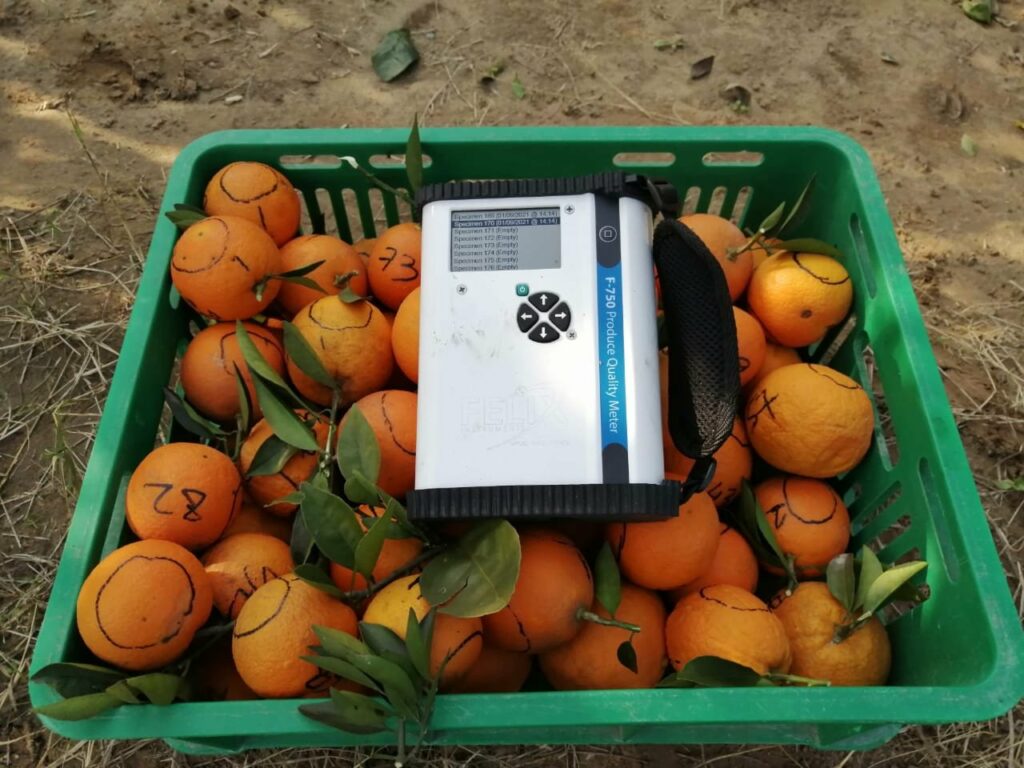A team of Pakistani scientists has achieved a significant scientific breakthrough by creating a novel artificial intelligence (AI)-based visual classification method that accurately evaluates the sweetness of native citrus fruits. Led by Dr. Ayesha Zeb from the National Centre of Robotics and Automation at the National University of Sciences and Technology (NUST), the team successfully predicted fruit sweetness with over 80 percent accuracy, without causing any damage to the fruit during the process.
To conduct their experiment, the researchers handpicked 92 citrus fruits, including varieties such as Blood Red, Mosambi, and Succari, from a farm in the Chakwal district. They employed a handheld spectrometer to capture spectra, which are patterns of bouncing light, from marked regions on the fruits’ skin. The team utilized near-infrared (NIR) spectroscopy, a technique that allows for the analysis of non-visible light spectra, to examine the fruit samples. Out of the 92 fruits, 64 were used for calibration, while 28 were utilized for prediction through the spectrometer.
Although the application of NIR spectroscopy in non-destructive fruit classification is not new, the Pakistani team’s innovative approach involved applying it to model the sweetness of local fruits. Additionally, they integrated artificial intelligence algorithms for the direct classification of orange sweetness, resulting in improved accuracy.
Traditionally, assessing fruit sweetness involved chemical and sensory testing. Oranges’ sweetness is typically determined by measuring the total sugars, known as Brix, while citric acid levels are indicated by titratable acidity (TA). To develop the AI model, the team obtained reference values for Brix, TA, and fruit sweetness by peeling off samples from the marked areas used for spectroscopy.
Laboratory testing of the juice extracted from the samples provided actual Brix and TA values. Furthermore, human volunteers tasted the fruits and categorized them as flat, sweet, or very sweet.
Using the obtained spectrum, reference values, and sweetness labels, the team trained the AI algorithm on a total of 128 samples. The AI model was designed to predict Brix, TA, and sweetness levels based on spectral data. To evaluate the model’s accuracy, the researchers tested it with data from 48 new fruits, comparing the predicted values with actual measurements obtained through sensory evaluations and chemical analysis.
The results were astonishing, as the AI model not only accurately predicted the values of Brix, TA, and overall sweetness but also surpassed traditional methods in sweetness prediction. The model achieved an overall accuracy rate of 81.03 percent for identifying sweet, mixed, and acidic tastes.
This scientific breakthrough has significant implications for the citrus industry, particularly in the estimation of citrus fruit quality. Unlike bananas and mangoes, oranges do not ripen further once harvested from the tree. Therefore, this innovative AI-based method could streamline and enhance the assessment of citrus fruit sweetness, benefiting the industry and ensuring better consumer satisfaction.
Pakistan, as the sixth-largest producer of citrus fruits globally with 0.46 million tons of exports in 2020, stands to gain from this advancement.
The research findings have been published in Nature, a prestigious research journal.
The project was a collaborative effort led by Dr. Ayesha Zeb and Dr. Mohsin Islam Tiwana from the National Centre of Robotics and Automation at the National University of Sciences and Technology (NUST); Dr. Waqar Shahid Qureshi from the School of Computer Science, Technological University Dublin Ireland; Dr. Abdul Ghafoor, Dr. Muhammad Imran, and Dr. Alina Mirza from the Military College of Signals NUST; Dr. Amanullah Malik from the Institute of Horticultural Sciences, University of Agriculture, Faisalabad; and Dr. Eisa Alanazi from the Department of Computer Science Umm Al-Qura University, Makkah, Saudi Arabia.
In addition to benefiting the citrus industry, the AI-based method developed by Pakistani scientists has broader implications for the field of agriculture and food quality assessment. By successfully applying AI algorithms and spectroscopy techniques to predict fruit sweetness, this research paves the way for similar advancements in the evaluation of other fruits and agricultural products. The non-destructive nature of the method ensures that farmers and producers can assess fruit quality without compromising the market value or shelf life of their produce. Moreover, this breakthrough showcases the potential of AI and technology to revolutionize various sectors and solve complex challenges in a precise and efficient manner.
Read More:






 Pakistani Students Excel at Huawei ICT Competition 2022-2023 Global Final
Pakistani Students Excel at Huawei ICT Competition 2022-2023 Global Final